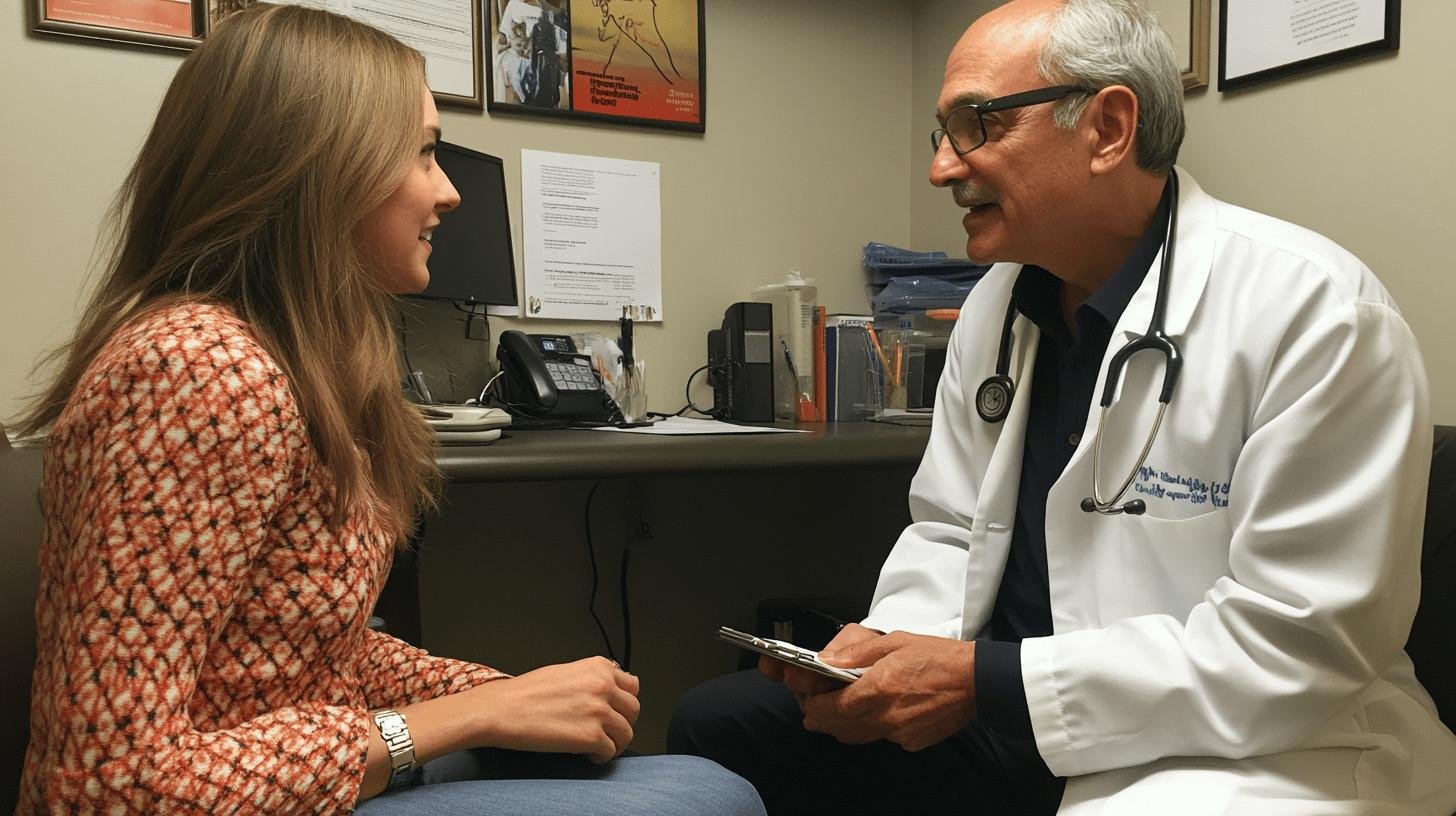TL;DR:
- COPD Management: Focus on symptom control, progression prevention, and flare-up action steps.
- Quitting Smoking: Key for management; contributes to 90% of COPD deaths. Use therapies and support resources.
- Medications: Include bronchodilators, corticosteroids, phosphodiesterase-4 inhibitors, and antibiotics.
- Lifestyle Changes: Regular exercise (walking, cycling) and a balanced diet help manage symptoms.
- Breathing Exercises: Pursed-lip, diaphragmatic breathing, and controlled coughing improve lung function.
- Home Modifications: Use air purifiers and non-toxic products and ensure ventilation for cleaner air.
- Emotional Support: Mental health is critical; use mindfulness, therapy, and support groups.
- Direct Primary Care: Offers personalized care, lowers costs, and improves health outcomes.
Have you ever wondered what the best way to manage COPD is? You’re not alone. Managing COPD can feel like trying to juggle while riding a unicycle. But don’t worry, it’s possible to regain control over your health! The key lies in a mix of effective strategies and proactive planning tailored to your unique needs. Proper guidance allows you to manage symptoms, prevent flare-ups, and enjoy life fully. Ready to dive into some actionable measures that can make a real difference? Let’s explore how to manage COPD effectively!
Effective COPD Management Strategies
Managing COPD is about staying ahead of symptoms and keeping them under control. The secret lies in combining strategies that improve your quality of life. Treatments are customized to match the severity of your symptoms, focusing on symptom control, disease progression, and complication prevention.
Regular exercise and a healthy diet are vital in this plan. They boost lung strength, help with weight management, and protect against further damage. Quitting smoking is crucial, too, alongside medications that open airways and manage inflammation.
Here’s what a comprehensive COPD action plan includes:
- Daily medication schedule: Keep track of your medications.
- Symptom monitoring: Record changes in breathing and energy.
- Emergency contact list: List healthcare contacts and loved ones.
- Action steps for flare-ups: Know what to do if symptoms worsen.
- Lifestyle adjustments: Integrate exercise, diet, and stress management.
Regular healthcare check-ins and a responsive treatment plan can set you up for success. Stay proactive to handle COPD effectively!
Importance of Smoking Cessation in COPD

Quitting smoking is vital for managing COPD because smoking is the main cause and leads to 90% of COPD deaths in the U.S. Cigarette chemicals harm the lungs, causing inflammation and narrowing airways, which makes breathing difficult and accelerates lung damage. However, stopping smoking can prevent further damage and slow COPD progression, giving your lungs a chance to heal!
Consider these resources to quit smoking:
- Nicotine replacement therapies: Patches, gums, or lozenges help curb cravings.
- Prescription medications: Ask your doctor about Chantix or Zyban.
- Support groups: Connect with others on the same journey.
- Counselling sessions: Receive tailored advice from healthcare professionals.
- Quitline services: Access free support via phone.
Breaking free from smoking significantly boosts lung function, reduces symptoms, and improves life quality. Every smoke-free day strengthens your lungs—keep going!
Medication Options and Usage for COPD
Medications are essential for managing COPD as they help you breathe easier and control symptoms. Key medications include bronchodilators, which relax airway muscles for better airflow, and inhaled corticosteroids, which reduce inflammation. Some have combination inhalers for double action. Oral steroids are crucial during flare-ups but should not be used long-term. Phosphodiesterase-4 inhibitors target inflammation, while theophylline relaxes lung muscles. Antibiotics tackle infections that may worsen symptoms.
Using an inhaler correctly is crucial for success. Precision ensures medication reaches deep into the lungs. Breathing out fully before slowly inhaling the medication is key. A spacer can help you receive the full dose.
| Medication Type | Purpose | Side Effects | |-----------------------------|----------------------------------|--------------------------------| | Bronchodilators | Relax airway muscles | Tremors, increased heart rate | | Inhaled Corticosteroids | Reduce inflammation | Hoarseness, oral thrush | | Phosphodiesterase-4 Inhibitors| Decrease inflammation, mucus | Nausea, weight loss | | Antibiotics | Fight infections | Diarrhea, allergic reactions |
Discuss medication plans with your healthcare provider. They tailor medications to fit your symptoms and lifestyle, ensuring the best outcomes. Keep communication channels open!
Lifestyle Changes for Better COPD Management

Lifestyle changes play a significant role in COPD management. Exercise is particularly beneficial. Activities like walking or strength training enhance stamina and respiratory muscle strength. If you are wondering which exercises are safe, walking, cycling, and water aerobics are highly recommended, as they increase heart rate without overburdening the lungs. Regular exercise can also lift your mood and energy levels.
Explore these dietary tips for COPD:
- Fruits and veggies: Rich in antioxidants to combat inflammation.
- Whole grains: Packed with fibre, aiding digestion and energy.
- Lean protein: Like chicken and fish, for muscle maintenance.
- Stay hydrated: Water helps thin mucus for easier clearance.
- Limit salt: Too much can cause fluid retention and straining breathing.
Maintaining a healthy weight is vital for COPD management. Being underweight can diminish energy reserves needed for breathing, while excess weight strains the lungs. Finding the right balance supports easier breathing and overall well-being.
Lifestyle changes enhance COPD management. Embrace regular exercise and a balanced diet for more good days and control over your condition. Keep moving forward!
Breathing Exercises and Pulmonary Rehabilitation
Pulmonary rehabilitation is a powerful tool for your lungs! It boosts mobility when dealing with COPD. The program typically includes exercise training, nutritional advice, and education about managing COPD. Benefits include enhanced stamina, easier breathing, and increased energy. Pulmonary rehab improves your ability to exercise, enabling you to accomplish more with less breathlessness. As part of rehab, you’ll access a team of health professionals who tailor plans for you, supporting your journey to better health.
Try these simple breathing exercises:
- Pursed-lip breathing: Inhale through your nose and exhale through pursed lips.
- Diaphragmatic breathing: Focus on belly expansion during deep inhalation.
- Huff coughing: Deep breath in, hold, then a forceful exhale.
- Controlled coughing: Inhale deeply, hold, and cough twice to clear airways.
Incorporating these exercises daily can significantly improve your respiratory muscles. Regular practice helps you breathe better and achieve more without fatigue. Keep it up!
Environmental and Home Modifications for COPD

Enhancing the air quality at home is vital for COPD management. Avoid pollutants and use air filtration systems. Clean air reduces symptoms and eases breathing. Strong-smelling chemicals and smoke should be avoided, as they can trigger flare-ups. Air purifiers capture small particles lingering indoors, helping your lungs function more easily.
Consider these practical home modifications:
- Use an air purifier, Preferably with a HEPA filter, to trap allergens.
- Choose non-toxic cleaning products: Opt for natural or fragrance-free options.
- Control humidity levels: A dehumidifier can prevent mould growth.
- Ensure ventilation: Open windows or use exhaust fans for fresh air.
A COPD-friendly living space supports health, reduces respiratory stress, and controls symptoms. Implementing these changes can lead to significant improvements in daily life.
Emotional and Mental Health Support for COPD Patients
Living with COPD is emotionally challenging. It’s not just physical symptoms; emotional stress is real. Patients often feel anxiety and depression as they adapt. The fear of exacerbations and activity limitations add to the emotional burden. Stress can trigger COPD flare-ups, making stress management crucial. Mental health support assists in handling the emotional aspects, helping patients manage COPD effectively.
Explore these stress reduction techniques:
- Mindfulness meditation: Calms and focuses the mind.
- Breath-focused relaxation: Complements breathing exercises.
- Therapy sessions: Professional guidance for emotional challenges.
- Online COPD forums: Connect with others for shared experiences.
COPD support groups and mental health professionals are invaluable. They offer support, advice, and a sense of community. Engaging with these resources can greatly enhance life quality, easing the emotional load and making it more manageable.
Role of Direct Primary Care in COPD Management

Direct primary care (DPC) transforms COPD management. Why does it matter? DPC provides personalized treatment plans essential for symptom control, slowing disease progression, and lowering complication risks. Imagine a healthcare approach as unique as you. With DPC, physicians focus on understanding and fine-tuning treatments to fit lifestyles, resulting in improved health outcomes and life quality.
Financially, DPC reduces costs by eliminating insurance complexities. Patients pay a clear monthly fee covering multiple services. This means no surprise bills or navigating insurance claims. Patients receive needed care without financial strain. With fewer patients, doctors deliver higher-quality care without administrative distractions.
Consider these DPC benefits for COPD management:
- Affordable monthly fees: Avoid surprise bills and complex claims.
- More time with doctors: Personalized attention enhances care.
- Easier access to services: Comprehensive care from check-ups to consultations.
Regular DPC consultations are vital for effective COPD management. A solid doctor-patient relationship ensures adherence to treatment plans and necessary adjustments. DPC treats symptoms and fosters a supportive partnership for your health journey. You’re not just another patient; you’re a valued team member.
Final Words
We’ve covered everything from smoking cessation’s role in COPD management to the power of lifestyle changes and medications. Tackling this condition involves various strategies like environmental mods and mental health support.
Remember, understanding what is the best way to manage COPD is a personal journey. It involves finding the right combination of treatment, exercise, and home adjustments that suit your life.
Here’s to taking charge of your health. Let’s make every breath count!
FAQ
What is the best medicine for COPD?
The best medicine for COPD may vary based on an individual’s specific symptoms and needs. Common medications include bronchodilators and inhaled corticosteroids, which help open airways and reduce inflammation.
How can I test myself for COPD?
Testing yourself for COPD isn’t easy, but your doctor can evaluate your symptoms and do a spirometry test, which measures lung function. If you’re concerned, get checked by a healthcare provider.
Is there a promising cure for COPD?
Currently, there’s no cure for COPD, but treatments can help manage symptoms and slow disease progression. Future research may bring more effective therapies, but for now, management is key.
What are the COPD medication options?
COPD medication options include bronchodilators, inhaled corticosteroids, combination inhalers, and phosphodiesterase-4 inhibitors. These help open airways, reduce inflammation and improve breathing.
How does nursing management of COPD work?
Nursing management of COPD involves monitoring symptoms, educating patients about lifestyle changes, ensuring medication adherence, and providing support during flare-ups. This holistic approach helps in better disease management.
What’s the best over-the-counter medicine for COPD?
While there are no specific over-the-counter medicines for COPD, over-the-counter cough medicines might help with symptoms. Always consult your doctor before using them for COPD treatment.
What are the COPD treatment guidelines?
COPD treatment guidelines focus on symptom relief, slowing disease progression, and improving quality of life through medications, lifestyle changes, and pulmonary rehabilitation.
What’s the best treatment for COPD in the elderly?
The best treatment for COPD in the elderly includes personalized medication, pulmonary rehabilitation, and lifestyle changes such as quitting smoking and regular exercise. Consultations with healthcare providers are essential.
What is the most successful treatment for COPD?
The most successful treatment combines medications, lifestyle adaptations, and pulmonary rehabilitation. Personalized plans optimize outcomes by addressing individual needs and health goals.
What must a person do if they have COPD?
If you have COPD, quitting smoking is crucial. It prevents further lung damage and improves your quality of life. Managing stress and following a treatment plan also helps.
What’s the best thing to help with COPD?
The best thing to help with COPD is a comprehensive management plan, including medications, breathing exercises, and lifestyle changes like quitting smoking and maintaining a healthy weight.
What is the secret to surviving COPD?
The secret to surviving COPD is ongoing management: taking prescribed medications, engaging in pulmonary rehabilitation, quitting smoking, and regularly consulting with your healthcare provider.

